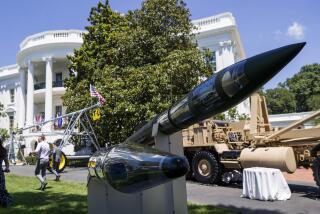Israel, Jordan Agree on Plan to End State of War
- Share via
WASHINGTON — Israel and Jordan will end their technical state of war and lay out plans for a normalization of relations at a groundbreaking summit at the White House today, according to officials from both countries.
The declaration of nonbelligerency, drafted in an intense last-minute effort Sunday, is to be signed by Israeli Prime Minister Yitzhak Rabin and Jordan’s King Hussein. The leaders are scheduled to meet with President Clinton in the Oval Office this morning.
Some U.S. officials had said there was some uncertainty about whether the declaration would be ready by then. Late Sunday, however, Israeli Foreign Minister Shimon Peres confirmed that a declaration is to be signed today. A senior Jordanian official confirmed the timing, according to Reuters news service.
Peres said the declaration will be a significant step that could “give daylight to peace.” But it would fall short of a formal peace treaty, which is still at least several months off, he said.
Israel and neighboring Jordan have not actually fought each other since the 1967 Arab-Israeli War, but a technical state of war has existed between the two nations since 1948. The two countries have quietly cooperated for years on border issues and scarce water resources; their state of war has been in name only since the early 1970s.
While relatively anticlimactic following the emotional White House agreement between Israel and the Palestine Liberation Organization in September, today’s session will still mark an important milestone for both sides. In an event that would have been unimaginable just a few years ago, for example, Hussein and Rabin will appear together before a joint session of Congress on Tuesday.
For the United States, the summit should signal the public rehabilitation of Jordan as an ally in the wake of the king’s controversial decision to support Iraqi President Saddam Hussein in the Persian Gulf War.
It will also give Clinton an opportunity to focus on a foreign policy success at a time when his national security team faces criticism on a wide array of other fronts, from Haiti to Bosnia-Herzegovina to North Korea.
U.S. Secretary of State Warren Christopher called today’s Israel-Jordan summit “both symbolic and a matter of substance,” especially in light of the Israeli-PLO meeting last year.
“It means that there is an acceptance of Israel and there is an acceptance of peace,” he said on ABC-TV’s “This Week with David Brinkley.” “I don’t think things will ever be the same in the Middle East after these historic events.”
Christopher said he hopes the summit will spur progress in peace talks between Israel and longtime foe Syria. Today’s meeting comes on the heels of Christopher’s visits last week to Syria and Israel in which he sought to jump-start those complex negotiations. Christopher met again in a closed-door session with Rabin on Sunday afternoon.
The secretary of state said he believes there is now a historic opportunity for a regional peace settlement. The “walls are coming down in the Middle East” as chilly relations between Israel and its neighbors begin to thaw in the post-Cold War world, he said.
In Damascus, Syrian President Hafez Assad said Sunday that talks with Israel are still at an “exploratory stage.”
Speaking after talks with Egyptian President Hosni Mubarak, Assad said efforts by the United States to revive Syrian-Israeli talks have made little progress.
Jerusalem has proposed a gradual pullback from the Golan Heights over five to eight years if Damascus agrees to full diplomatic ties, open borders and trade. But Syria has balked, arguing that Israeli withdrawal from the strategic heights must come before Syria moves to recognize Israel.
Christopher cautioned against expectations of rapid movement in the Israeli-Syrian negotiations.
“This is a very intertwined set of negotiations, probably the toughest negotiations of all,” he said.
“But when we see what has happened on the other tracks, I think we have to approach this with a sense that the parties are determined to move ahead. I think there is a historical moment there for Syria and Israel, and I think that they can see on the horizon some of the kind of progress that’s been made on the other tracks. “
More to Read
Sign up for Essential California
The most important California stories and recommendations in your inbox every morning.
You may occasionally receive promotional content from the Los Angeles Times.













